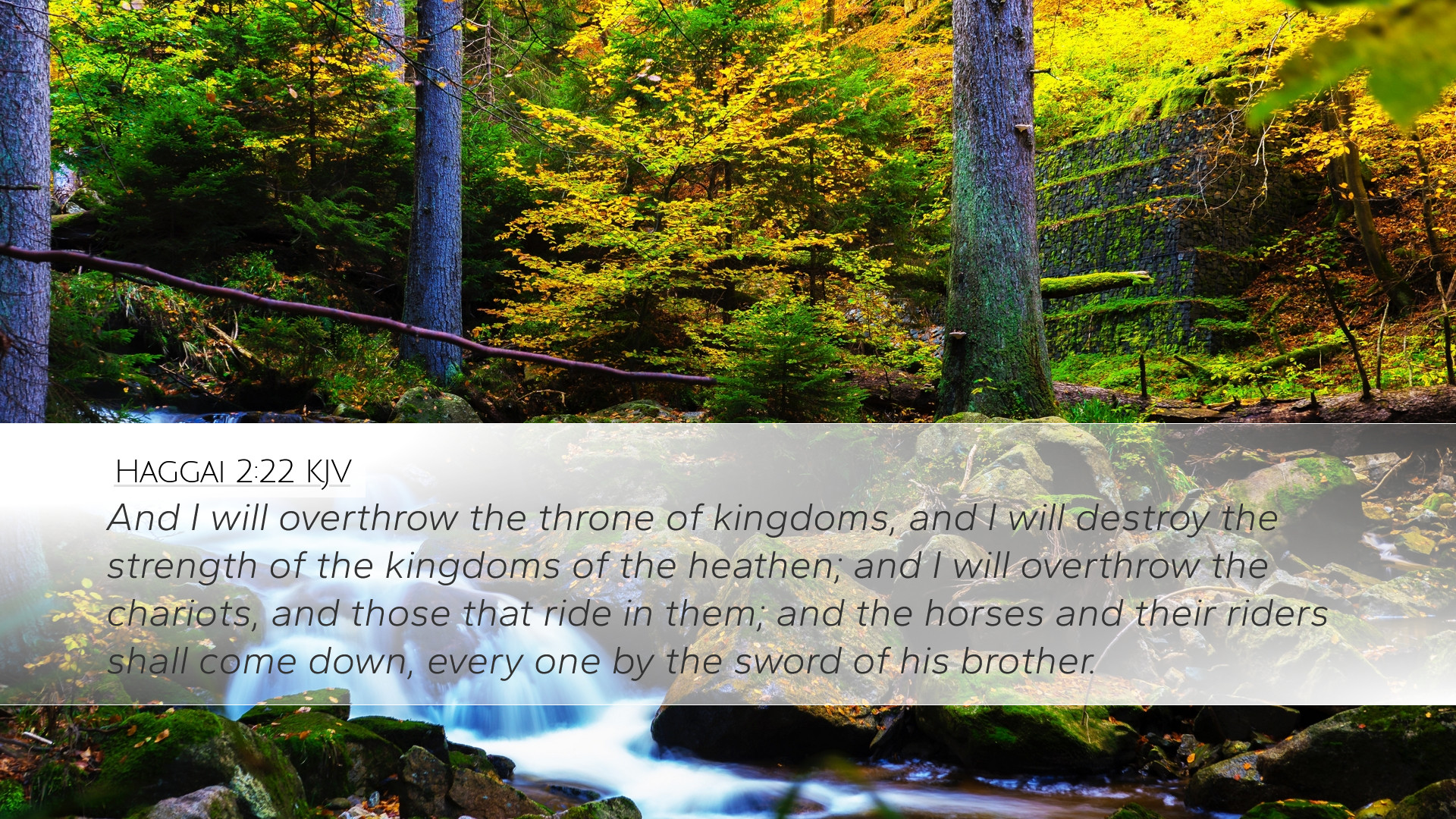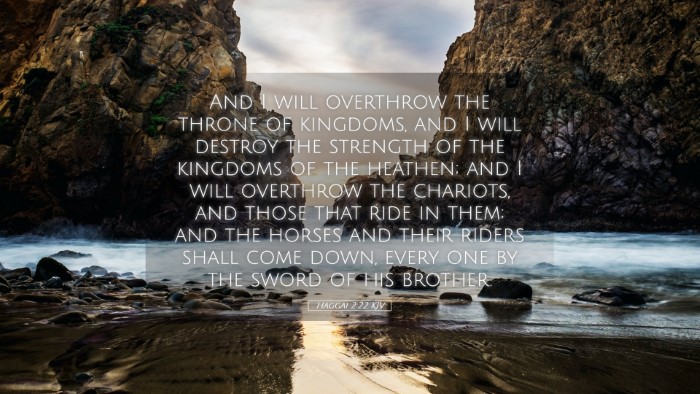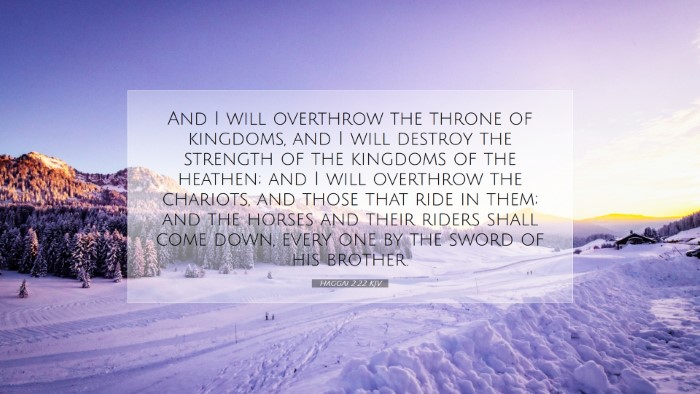Old Testament
Genesis Exodus Leviticus Numbers Deuteronomy Joshua Judges Ruth 1 Samuel 2 Samuel 1 Kings 2 Kings 1 Chronicles 2 Chronicles Ezra Nehemiah Esther Job Psalms Proverbs Ecclesiastes Song of Solomon Isaiah Jeremiah Lamentations Ezekiel Daniel Hosea Joel Amos Obadiah Jonah Micah Nahum Habakkuk Zephaniah Haggai Zechariah MalachiHaggai 2:22
Haggai 2:22 KJV
And I will overthrow the throne of kingdoms, and I will destroy the strength of the kingdoms of the heathen; and I will overthrow the chariots, and those that ride in them; and the horses and their riders shall come down, every one by the sword of his brother.
Haggai 2:22 Bible Commentary
Commentary on Haggai 2:22
Verse Text: "And I will overthrow the throne of kingdoms, and I will destroy the strength of the kingdoms of the heathen; and I will overthrow the chariots, and those that ride in them; and the horses and their riders shall come down, every one by the sword of his brother.
Contextual Overview
The Book of Haggai is a prophetic work that emerges in the context of the post-exilic community in Israel. Written after the return from Babylonian captivity, this verse occurs in a section where Haggai encourages the people to resume building the temple, emphasizing God's sovereignty and His plan for the restoration of Israel. Haggai addresses both the temporal and spiritual restoration of God’s people, intertwining themes of judgment and optimism.
Thematic Analysis
Haggai 2:22 articulately captures God's divine intervention in earthly dominions. This verse presents a promise of upheaval among the nations, underscoring His authority over all kingdoms:
- Divine Overthrow: The term "overthrow" signifies a divine act of judgment and intervention, asserting God's power to disrupt human authority and governance.
- Dismantling of War Machines: The mention of chariots and riders illustrates the military might of nations, which will not withstand God's will. The emphasis here is on the futility of human strength in the face of divine decree.
- Brotherly Conflict: The horrifying imagery of "every one by the sword of his brother" speaks to internal strife and discord, highlighting the destructive nature of human enmity that contrasts sharply with divine peace.
Insights from Public Domain Commentaries
Matthew Henry's Commentary
Henry notes that God’s sovereign rule is assured, and His plans will be realized despite human opposition. The phrase indicates a profound assurance that the kingdoms of this world, fortified by their might, will ultimately fall. Henry draws attention to how God’s intervention leads to the humbling of the proud and the exaltation of the humble.
Albert Barnes' Notes
Barnes emphasizes the historical and future dimensions of this prophecy. He argues that the passage spans beyond the immediate context of Haggai into the eschatological promise of God's final judgment. The overthrowing of kingdoms serves as a reminder of God’s commitment to justice and His control over human history. Barnes connects this verse to the assurances God gave to His people, reaffirming their significance in His redemptive plan.
Adam Clarke's Commentary
Clarke elaborates on the implications of the upheaval described in this verse. He suggests that it not only pertains to the earthly kingdoms but also signifies a spiritual purification. Clarke views this metaphorically, meaning that the true strength of God's people will come from their reliance on Him rather than on worldly means. The destruction of the chariots and horses can thus allude to the removal of obstacles before God's sovereignty.
Theological Implications
This passage presents several theological implications crucial for understanding God's engagement with history and His people:
- The Sovereignty of God: This verse reaffirms the belief in God as the ultimate authority over nations and history, reminding believers of His reign over all creation.
- Hope amidst Despair: For the returning exiles, this promise serves as a beacon of hope, encouraging them that despite the struggles they face, God is at work to vindicate and restore them.
- Human Conflict: The reference to "every one by the sword of his brother" forces a reflection on the nature of conflict in human relationships and evokes the need for healing and reconciliation through divine intervention.
Practical Applications
The theological truths captured in Haggai 2:22 resonate with contemporary Christian living:
- Trust in Divine Sovereignty: Believers are called to rest in the assurance that God governs the affairs of nations and their personal lives, encouraging a posture of faith over anxiety.
- Fostering Peaceful Relationships: The internal strife echoed in the verse serves as a poignant reminder of the need for unity and peace within the Christian community and beyond.
- Championing Justice: This passage calls Christians to engage in social justice initiatives, reflecting their assurance that God cares for the oppressed and marginalized.
Conclusion
Haggai 2:22 encapsulates a profound message about God's power, justice, and care for His people amidst turmoil. For pastors, theologians, and students, this verse serves as an enduring reminder of the sovereignty of God over the kingdoms of this world and His promise to bring about a significant transformation, restoring peace and order where chaos reigns. As we meditate on the richness of this text, may it inspire a renewed commitment to faithfulness, peace, and justice in our respective spheres of influence.


